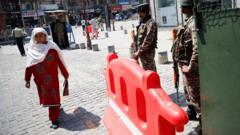Tensions are escalating between India and Pakistan after a militant attack in Kashmir, leading the US to intervene and request diplomatic dialogue to quell hostilities.
US Calls for Dialogue Between India and Pakistan Amid Rising Kashmir Tensions

US Calls for Dialogue Between India and Pakistan Amid Rising Kashmir Tensions
The US emphasizes collaboration between India and Pakistan following significant violence in Kashmir that left 26 civilians dead.
In the aftermath of a tragic militant assault in Indian-administered Kashmir that resulted in the deaths of 26 individuals, the United States has stepped in to urge both India and Pakistan to defuse escalating tensions. Secretary of State Marco Rubio, during discussions with Indian Foreign Minister S Jaishankar and Pakistani Prime Minister Shehbaz Sharif, highlighted the necessity for both nations to prioritize peace and security in the South Asian region.
India has attributed the April 22 attack near Pahalgam to Pakistani-backed militants, a claim that Islamabad has vehemently denied. As part of India's response, it recently closed its airspace to all Pakistani aircraft, marking another episode in a series of reciprocal actions from both sides. Following the attack, Jaishankar voiced the need for justice against those orchestrating violence in Kashmir, while Rubio expressed condolences and reinforced US support for India's counter-terrorism efforts.
In discussions with Sharif, Rubio condemned the attack and underscored the need for Pakistan to cooperate with investigations. Sharif, however, countered by dismissing Indian allegations of Pakistan's involvement and urged the US to pressure India to lessen its aggressive rhetoric. Rising fears of military action have been exacerbated by statements from Pakistan's government regarding credible intelligence of possible Indian strikes.
Intensifying military readiness has seen Indian Prime Minister Narendra Modi confer with senior defense officials multiple times as speculation mounts around a potential retaliatory strike. Concurrently, border exchanges of fire have been reported, and India has publicly expressed indignation over ceasefire violations.
Amid rising tensions, India recently suspended most visas for Pakistani nationals and halted a critical water-sharing agreement, to which Pakistan responded by implementing its own visa restrictions and suspending a bilateral peace treaty. The fallout has seen significant movement across the border, with hundreds of Pakistani people leaving India. Notably, India's government has also curtailed access to Pakistani celebrities' social media accounts and restricted numerous news channels it deems incendiary.
The Kashmir region has remained a point of contention between India and Pakistan since the two nations gained independence in 1947. An insurgency has plagued Kashmir since 1989, leading to recurrent violence against both civilians and security forces, intensifying historical divides.
While Indian officials have so far withheld the identity of specific militant organizations responsible for the most recent attack, there are indications of involvement from groups linked to Pakistan, including Lashkar-e-Taiba, which India categorizes as a terrorist entity. Law enforcement has reportedly identified two Pakistani nationals among the perpetrators.
The deadly nature of this recent attack has provoked outrage across India, leading Modi to promise a determined pursuit of retribution against those responsible for the tragedy. "India will identify, track and punish" the identified attackers in a manner that exceeds conventional retribution, Modi asserted in a strong address soon after the incident.





















